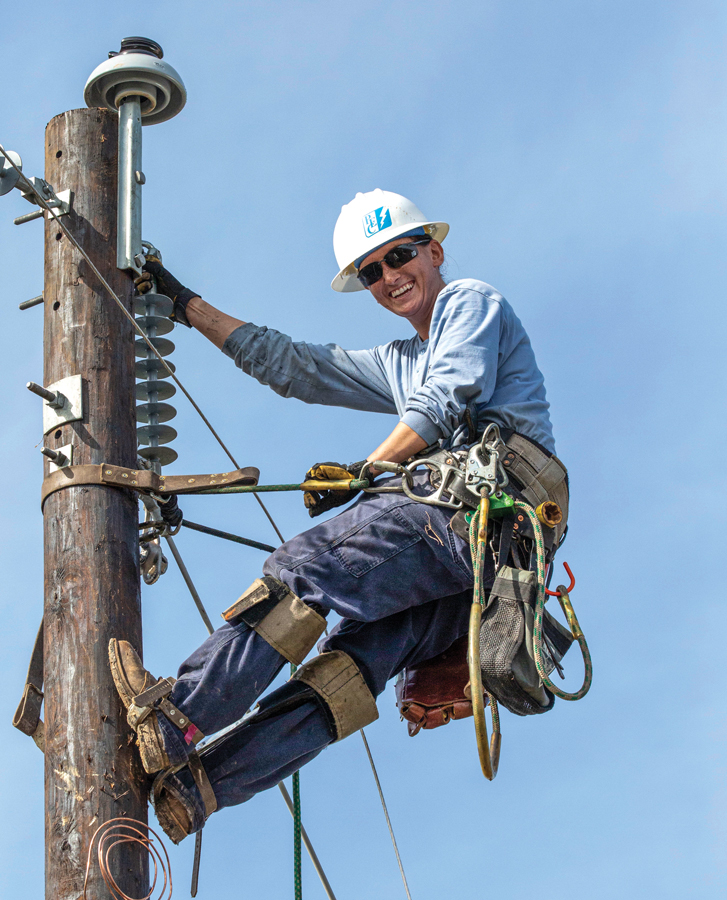Classroom responsibilities continue to increase, yet state funding, even for the most basic classroom necessities, inadequately covers the expenses. Though teachers feel the pressure, their commitment to their students exceeds the challenges they face. Teachers are resourceful and resilient, but they could use some help. Now several Illinois electric co-ops are providing just that.
One of the seven Cooperative Principles is “concern for community.” Helping to enhance educational opportunities for schools is one way to demonstrate that, and some Illinois electric cooperatives are providing grants for classrooms. These grants, which vary in number and amount depending on the co-op, are designed to help pay for supplies, equipment or educational programs that aren’t covered by traditional school funding.

This year, Eastern Illini Electric Cooperative (EIEC) in Paxton provided $500 Empowering Education Grants to 40 schools in its 10-county service territory. According to Mike Wilson, the co-op’s vice president of member & community relations, the co-op chose that number of grants because it’s roughly the number of schools in its service territory.
“Teachers always seem to be short on funds or are spending money out of their own pockets,” Wilson explains. “We are dedicated to serving our members and our communities. The Empowering Education Grant Program was designed to positively impact students by helping them to be able to do engaging projects that would go unfunded. Most teachers have tons of ideas on how to engage students but don’t have the budget to make it happen. We hope this program can help in those situations.”
Do you remember reading as a child? How you hung on each word and imagined what the characters looked and sounded like? One of EIEC’s grants helped some students at Iroquois West Grade School in Gilpin see books spring to life.
Chris Basham, a reading teacher for grades kindergarten through third, was seeking a way to encourage students to read during the summer. She saw a READiculous reading program presentation and thought it would be ideal.
READiculous is offered through the Decatur Public Library. Through it, program facilitators Alissa Henkel and Susan Bishop come to schools, read books aloud and act them out. When Basham brought READiculous to the school, it resounded with the students.
“It’s a really good role model for them to see somebody acting out, getting crazy with the stories, and making stories exciting and fun for them,” Basham says. “They were engaged the whole time.” READiculous also encourages students to visit their local library and engage in reading more extensively by acting out stories with their friends.
The grant has long-term benefits for Basham. She explains, “My job as the reading teacher is to promote literacy and have students be lifelong lovers of reading.” This program has helped make that possible.
Southern Illinois Electric Cooperative (SIEC) in Dongola has provided Touchstone Energy Classroom Empowerment Grants since the early 2000s and awarded seven $500 grants for the 2018/2019 school year.
Population loss, which affects school funding, has hit southern Illinois hard. Chris Boyd, SIEC’s director of member services, says it’s evident in some grant requests he’s received. He explains, “We had a school that applied for textbooks and books for the library because they couldn’t afford to buy them.” At times, when a school has received a grant and the cost has exceeded the grant amount, Boyd has seen teachers either pay the difference themselves or coordinate a fundraiser.

At Cairo Junior/Senior High School, in deep southern Illinois, the enrollment has dropped to 135. Business/computer teacher Ryan O’Shea says, “This is a high poverty area. Since we no longer have shop or home economics classes, I am the last vocational teacher in the school.” Despite the challenges, he is doing all he can to give students the best possible classroom experience for their future success.
O’Shea has applied for and received multiple grants from SIEC, and the local municipal power provider, Cairo Public Utility Company, has matched them dollar for dollar. O’Shea’s latest grant was used to purchase two digital and two video cameras. He says, “Every little bit helps. The grants have provided long-lasting equipment used for multimedia classes, and the extra projects enhance what we can do in the class.”
The students used the cameras to create a project titled “A Historical Tourism Documentary,” a video to showcase the importance of local tourism in Cairo and Alexander County. The video was presented to legislators in May at the Illinois State Capitol during the Illinois Computing Education Conference.
Through the project, students learned valuable skills for future careers – how to research, produce videos and lobby legislators who visited with them at the conference for more technology funding and opportunities in schools.
The funding for these special projects helped to enrich the students’ educational experience. Education is the foundation of tomorrow’s leaders. In their rural communities, co-ops are helping to build on it, one grant at a time.








